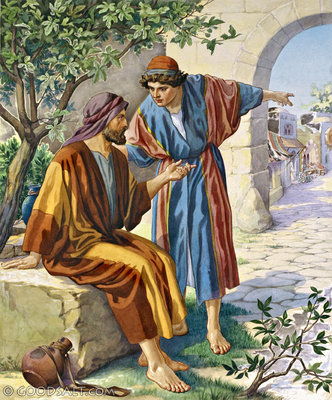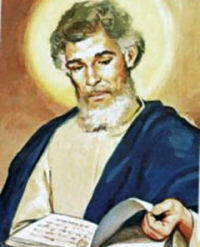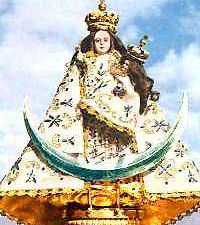A Christian Pilgrim
SON OF TOLMAI: ST. BARTHOLOMEW THE APOSTLE
(A biblical reflection on the Feast of St. Bartholomew, August 24, 2013)
Gospel Reading: Jn 1:45-51
First Reading: Rev 21:9-14; Psalms: Ps 145:10-13,17-18

The Scripture Text
Philip found Nathanael, and said to him, “We have found Him of whom Moses in the law and also the prophets wrote, Jesus of Nazareth, the son of Joseph.” Nathanael said to him, “Can anything good come out of Nazareth?” Philip said to him, “Come and see.” Jesus saw Nathanael coming to Him, and said of him, “Behold, an Israelite indeed, in whom is no guile!” Nathanael said to Him, “How do you know me?” Jesus answered him, “Before Philip called you, when you were under the fig tree, I saw you.” Nathanael answered Him, “Rabbi, You are the Son of God! You are the King of Israel!” Jesus anwered him, “Because I said to you, I saw you under the fig tree, do you believe? You shall see greater things than these.” And He said to him, “Truly, truly, I say to you, you will see heaven opened, and the angels of God ascending and descending upon the Son of man.” (Jn 1:45-51)
Today is the feast of St. Bartholomew (Hebrew: bar Tolmai; son of Tolmai), one of the apostles, whose name appears in all the apostolic lists (Matthew 10:2-4; Mark 3:16-19; Luke 6:14-16; Acts of the Apostles 1:13) but nowhere else in the New Testament. John is the only writer to mention the apostle Nathanael, but tradition considers him to be the disciple named Bartholomew in the other Gospels. “Bartholomew” could have been Nathanael’s surname. Bartholomew is always listed beside the name of Philip, the one who John tells us introduced Nathanael to Jesus (John 1:45-46).
When Philip shared his belief that Jesus might be the Messiah, Nathanael replied, “Can anything good come out of Nazareth?” (John 1:46). Rabbinical thinking held that the Messiah would come from Judea, the land of David – most certainly not from a region sucah as Galilee, overrun by Gentiles. More than a cynical remark or a statement of unbelief, Nathanael’s reaction revealed a firm adherence to God’s word as he understood it, and a willingness to have his assumptions challenged. The fact that he accepted Phillip’s invitation to meet Jesus says much about Nathanael’s openness to the truth.
With fitting irony, having never spoken a word with Nathanael, Jesus declared, “Behold, and Israelite indeed, in whom there is no guile!” (John 1:47). Nathanael’s openness impressed Jesus. He saw very little cynicism, suspicion, or prejudice in the person of Nathanael. This man did not hide behind masks. Instead, he spoke truthfully (sometimes bluntly) and expected nothing less in return. Consequently, Jesus explained that He knew Nathanael by having seen him under the fig tree. Rabbis were known to congregate around fig trees to discuss God’s word. Nathanael’s open heart must have been fertile ground indeed for God’s word to take root.
God wants to give us the same freedom and openness that Nathanael had. Being without guile is not just a natural attribute, but comes as we place our security in the hands of Jesus. Knowing His forgiveness and trusting in His Father’s provision, we will have no need for the defenses and cynical self-protection that are so much a part of this world. Like Nathanael, let us immerse ourselves in Scripture and let the word of God heal us of all guile.
Prayer: Lord Jesus, You know us better than we know ourselves. May Your Holy Spirit remove our guile and make us lights that clearly reflect Your glory. Amen.
45. Philip finds Nathaniel, and said to him, We have found him, of whom Moses in the law, and the prophets, did write, Jesus of Nazareth, the son of Joseph.
46. And Nathaniel said to him, Can there any good thing come out of Nazareth? Philip said to him, Come and see.
CHRYS. Philip is not persuaded himself, but begins preaching to others: Philip finds Nathanael, and said to him, We have found Him of whom Moses in the Law, and the Prophets, did write, Jesus of Nazareth, the Son of Joseph. See how zealous he is, and how constantly he is meditating on the books of Moses, and looking for Christ's coming. That Christ was coming he had known before; but he did not know that this was the Christ, of whom Moses and the Prophets did write: He says this to give credibility to his preaching, and to show his zeal for the Law and the Prophets, and how that he had examined them attentively. Be not disturbed at his calling our Lord the Son of Joseph; this was what He was supposed to be.
AUG. The person to whom our Lord's mother had been betrothed. The Christians know from the Gospel, that He was conceived and born of an undefiled mother. He adds the place too, of Nazareth.
THEOPHYL. He was bred up there: the place of His birth could not have been known generally, but all knew that He was bred up in Nazareth.
And Nathanael said to him, Can there any good thing come out of Nazareth.
AUG. However you may understand these words, Philip's answer wild suit. You may read it either as affirmatory, Something good can come out of Nazareth; to which the other says, Come and see: or you may read it as a question, implying doubt on Nathanael's part, Can any good thing come out of Nazareth? Come and see. Since either way of reading agrees equally with what follows, we must inquire the meaning of the passage. Nathanael was well read in the Law, and therefore the word Nazareth (Philip having said that he had found Jesus of Nazareth) immediately raises his hopes, and he exclaims, Something good can come out of Nazareth. He had searched the Scriptures, and knew, what the Scribes and Pharisees could not, that the Savior was to be expected thence.
ALCUIN. He who alone is absolutely holy, harmless, undefiled; of whom the prophet said, There shall come forth a rod out of the stem of Jesse, and a branch (Nazaraus) shall grow out of his roots. Or the words may be taken as expressing doubt, and asking the question.
CHRYS. Nathanael knew from the Scriptures, that Christ was to come from Bethlehem, according to the prophecy of Micah, And you, Bethlehem, in the land of Judah, - out of you shall come a Governor, that shall rule my people Israel. On hearing of Nazareth, then, he doubted, and was not able to reconcile Philip's tidings with prophecy. For the Prophets call Him a Nazarene, only in reference to His education and mode of life. Observe, however, the discretion and gentleness with which he communicates his doubts. He does not say, You deceive me, Philip; but simply asks the question, Can any good thing come out of Nazareth? Philip too in turn is equally discrete. He is not confounded by the question, but dwells upon it, and lingers in the hope of bringing him to Christ: Philip said to him, Come and see. He takes him to Christ, knowing that when he had once tasted of His words and doctrine, he will make no more resistance.
47. Jesus saw Nathanael coming to him, and said of him, Behold an Israelite indeed, in whom is no guile!
48. Nathanael said to him, Whence know you me? Jesus answered and said to him, Before that Philip called you, when you were under the fig tree, I saw you.
49. Nathanael answered and said to him, Rabbi, you are the Son of God; you are the King of Israel.
50. Jesus answered and said to him, Because I said to you, I saw you under the fig tree, believe you? you shall see greater things than these.
51. And he said to him, Verily, verily, I say to you, Hereafter you shall see heaven open, and the angels of God ascending and descending upon the Son of man.
CHRYS. Nathanael, in difficulty as to Christ coming out of Nazareth, showed the care with which he had read the Scriptures: his not rejecting the tidings when brought him, showed his strong desire for Christ's coming. He thought that Philip might be mistaken as to the place. It follows, Jesus saw Nathanael coming to Him, and said of him, Behold an Israelite indeed, in whom is no guile! There was no fault to be found with him, though he had spoken like one who did not believe, because he was more deeply read in the Prophets than Philip. He calls him guileless, because he had said nothing to gain favor, or gratify malice.
AUG. What means this, In whom is no guile? Had he no sin? Was no physician necessary for him? Far from it. No one was ever born, of a temper not to need the Physician. It is guile, when we say one thing, and think another. How then was there no guile in him? Because, if he was as a sinner, he confessed his sin; whereas if a man, being a sinner, pretends to be righteous, there is guile in his mouth. Our Lord then commended the confession of sin in Nathanael; He did not pronounce him not a sinner.
THEOPHYL. Nathanael however, notwithstanding this praise, does not acquiesce immediately, but waits for further evidence, and asks, Whence know You me?
CHRYS. He asks as man, Jesus answers as God: Jesus answered and said to him, Before that Philip called you, when you were under the fig tree, I saw you: not having, beheld him as man, but as God discerning him from above. I saw you, He says, that is, the character of the life, when you were under the fig tree: where the two, Philip and Nathanael, had been talking together alone, nobody, seeing them; and on this account it is said, that on seeing him a long way off, He said, Behold an Israelite indeed; whence it appears that this speech was before Philip came near, so that no suspicion could attach to Christ's testimony. Christ would not say, I am not of Nazareth, as Philip told you, but of Bethlehem; in order to avoid an argument: and because it would not have been sufficient proof, had He mentioned it, of His being the Christ. He preferred rather proving this by His having been present at their conversation.
AUG. Has this fig tree any meaning? We read of one fig tree which was cursed, because it had only leaves, and no fruit. Again, at the creation, Adam and Eve, after sinning, made themselves aprons of fig leaves. Fig leaves then signify sins; and Nathanael, when he was under the fig tree, was under the shadow of death: so that our Lord seems to say, O Israel, whoever of you is without guile, O people of the Jewish faith, before that I called you by My Apostles, when you were as yet under the shadow of death, and saw Me not, I saw you.
GREG. When you were under the fig tree, I saw you; i.e. when you were yet under the shade of the law, I chose you.
AUG. Nathanael remembered that he had been under the fig tree, where Christ was not present corporeally, but only by His spiritual knowledge. Hence, knowing that he had been alone, he recognized our Lord's Divinity.
CHRYS. That our Lord then had this knowledge, had penetrated into his mind, had not blamed but praised his hesitation, proved to Nathanael that He was the true Christ: Nathanael answered and said to Him, Rabbi, You are the Son of God, You are the King of Israel: as if he said, You are He who was expected, you are He who was sought for. Sure proof being obtained, he proceeds to make confession; herein showing his devotion, as his former hesitation had shown his diligence.
ID. Many when they read this passage, are perplexed at finding that, whereas Peter was pronounced blessed for having, after our Lord's miracles and teaching, confessed Him to be the Son of God, Nathanael, who makes the same confession before, has no such benediction. The reason is this. Peter and Nathanael both used the same words, l but not in the same meaning. Peter confessed our Lord to he the Son of God, in the sense of very God; the latter in the sense of mere man; for after saying, You are the Son of God, he adds, You are the King of Israel; whereas the Son of God was not the King of Israel only, but of the whole world. This is manifest from what follows. For in the case of Peter Christ added nothing, but, as if his faith were perfect, said, that he would build the Church upon his confession; whereas Nathanael, as if his confession were very deficient, is led up to higher things: Jesus answered and said to him, Because I said to you, I saw you under the fig tree, believe you? You shall see greater things than these. As if He said, What I have just said has appeared a great matter to you, and you have confessed Me to be King of Israel; what will you say when you see greater things than these? What that greater thing is He proceeds to show: And He said to him, Verily, verily, I say to you, Hereafter you shall see heaven open, and the angels of God ascending and descending upon the Son of man. See how He raises him from earth for a while, and forces him to think that Christ is not a mere man: for how could He be a mere man, whom angels ministered to? It was, as, as it were, saying, that He was Lord of the Angels; for He must be the King's own Son, on whom the servants of the King descended and ascended; descended at His crucifixion, ascended at His resurrection and ascension. Angels too before this came and ministered to Him, and angels brought the glad tidings of His birth. Our Lord made the present a proof of the future. After the powers He had already shown, Nathanael would readily believe that much more would follow.
AUG. Let us recollect the Old Testament account. Jacob saw in a dream a ladder reaching from earth to heaven; the Lord resting upon it, and the angels ascending and descending upon it. Lastly, Jacob himself understanding what the vision meant, set up a stone, and poured oil upon it. When he anointed the stone, did he make an idol? No: he only set up a symbol, not an object of worship You see here the anointing; see the Anointed also. He is the stone which the builders refused. If Jacob, who was named Israel, saw the ladder, and Nathanael was an Israelite indeed, there was a fitness in our Lord telling him Jacob's dream; as if he said, Whose name you are called by, his dream has appeared to you: for you shall see the heaven open, and the angels of God ascending and descending upon the Son of man. If they descend upon Him, and ascend to Him, then He is both up above and here below at the same time; above in Himself, below in His members.
AUG. Good preachers, however, who preach Christ, are as angels of God; i.e. they ascend and descend upon the Son of man; as Paul, who ascended to the third heaven, and descended so far even as to give milk to babes. He said, We shall see greater things than these: because it is a greater thing that our Lord has justified us, whom He has called, than that He saw us lying under the shadow of death. For had we remained where He saw us, what profit would it have been? It is asked why Nathanael, to whom our Lord bears such testimony, is not found among the twelve Apostles. We may believe, however, that it was because he was so learned, and versed in the law, that our Lord had not put him among the disciples. He chose the foolish, to confound the world. Intending to break the neck of the proud, He sought not to gain the fisherman through the orator, but by the fisherman the emperor. The great Cyprian was an orator; but Peter was a fisherman before him; and through him not only the orator, but the emperor, believed.
Catena Aurea John 1





